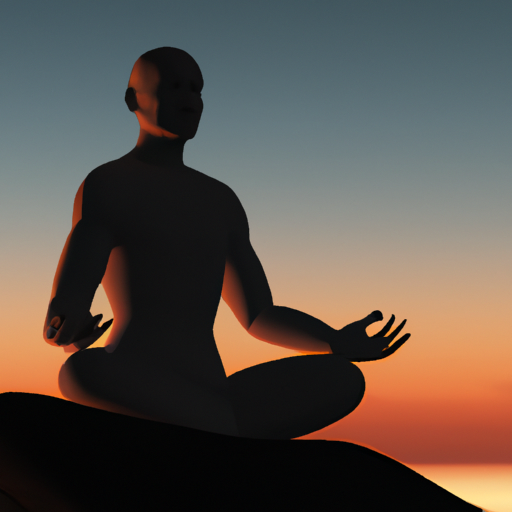
The Science Behind Meditation: How It Benefits Your Mind and Body
Meditation has been practiced for centuries by various cultures and religions as a way to achieve inner peace and spiritual enlightenment. However, in recent years, the practice of meditation has gained widespread popularity in the Western world due to its scientifically proven benefits for both the mind and body.
At its core, meditation is the act of training the mind to focus and redirect thoughts. This can be done through various techniques such as mindfulness, guided visualization, or mantra repetition. While the practice may seem simple, the effects it has on the brain and body are far-reaching and significant.
One of the most well-researched benefits of meditation is its ability to reduce stress and anxiety. When we experience stress, our bodies release the hormone cortisol, which can have harmful effects on our health if it remains elevated for extended periods. Studies have shown that regular meditation can reduce cortisol levels, leading to a decrease in stress and anxiety. This is because meditation activates the parasympathetic nervous system, also known as the “rest and digest” response, which helps the body relax and counteracts the effects of stress.
In addition to reducing stress, meditation has also been found to improve overall mental health. Studies have shown that regular meditation can increase levels of feel-good hormones, such as serotonin and dopamine, while decreasing levels of the stress hormone, cortisol. This can lead to improved mood, decreased symptoms of depression, and increased feelings of happiness and well-being.
Furthermore, meditation has been found to have positive effects on the
The Power of Relaxation Techniques: Improving Mental Health and Reducing Stress
Relaxation techniques are a set of practices that aim to reduce tension and promote a state of calmness and relaxation in both the mind and body. They can include a variety of activities such as deep breathing, meditation, progressive muscle relaxation, yoga, and guided imagery. These techniques have been used for centuries in various cultures and have gained popularity in recent years due to their numerous benefits for mental health.
One of the main benefits of relaxation techniques is their ability to reduce stress. When we are stressed, our body releases the hormone cortisol, which can have a negative impact on our physical and mental health. By practicing relaxation techniques, we can lower our cortisol levels, which in turn can help to reduce anxiety, improve mood, and even boost our immune system. This can lead to a more positive outlook on life and better overall mental health.
Moreover, relaxation techniques can also help to improve our focus and concentration. When we are stressed, our minds tend to be scattered and we may have difficulty concentrating on tasks. By practicing relaxation techniques, we can quiet our minds and improve our ability to focus, leading to increased productivity and efficiency.
Another important benefit of relaxation techniques is
From Lowering Blood Pressure to Boosting Immunity: The Physical Benefits of Meditation
Meditation has been practiced for centuries as a way to calm the mind, reduce stress, and find inner peace. However, recent studies have shown that the benefits of meditation go far beyond just mental well-being. In fact, regular meditation practice can have a significant impact on our physical health, from lowering blood pressure to boosting immunity.
One of the most well-known physical benefits of meditation is its ability to lower blood pressure. High blood pressure, also known as hypertension, is a common health issue that can lead to serious conditions such as heart disease and stroke. Studies have shown that regular meditation practice can help reduce blood pressure levels, both in people with hypertension and those with normal blood pressure. This is because meditation helps to relax the body and mind, which in turn reduces stress and tension in the muscles, leading to a decrease in blood pressure.
In addition to lowering blood pressure, meditation has also been found to boost the immune system. The immune system is responsible for fighting off infections and diseases, and a strong immune system is essential for maintaining good overall health. Research has shown that regular meditation practice can increase the activity of natural killer cells, which are a type of white blood cell that helps to fight off viruses and tumors. This means that people who meditate regularly are less likely to get sick and may have a faster recovery time if they do fall ill.
Furthermore, meditation has been linked to a decrease in inflammation in the body. Inflammation is the body’s natural response to injury or
Meditation and Relaxation for a Better Sleep: How These Practices Can Improve Your Rest
Meditation and relaxation are two powerful practices that have been used for centuries to promote a better sleep. In today’s fast-paced and stressful world, getting a good night’s rest has become increasingly difficult for many people. However, incorporating these practices into your daily routine can have a profound impact on the quality of your sleep.
Meditation is a technique involves focusing your mind on a particular object, thought, or activity to a state of mental clarity and emotional calmness. It has been practiced in various forms by different cultures and religions for thousands of years. In recent years, meditation has gained widespread popularity as a way to reduce stress, anxiety, and improve overall health.
One of the main benefits of meditation for sleep is ability to calm the mind relax the body. When we are stressed or anxious, our body produces a hormone called cortisol, which can interfere with our ability to fall asleep and stay asleep. By practicing meditation, we can reduce the levels of cortisol in our body, promoting a sense of relaxation and tranquility that is essential for a good night’s rest.
Moreover, meditation can also help to quiet the mind and reduce racing thoughts, which are common causes of insomnia. By focusing on the present moment and letting go of worries and distractions, we can create a peaceful and calm mental space that is conducive to sleep. This can be particularly helpful for those who struggle with racing thoughts or have a time shutting off their mind at night.
In
Enhancing Focus and Productivity: How Regular Meditation and Relaxation Can Improve Your Daily Life
In today’s fast-paced, it can be challenging to stay focused and productive. With endless distractions and constant demands, it’s easy to feel overwhelmed and stressed. However, there is a simple solution that can greatly enhance your focus and productivity – regular meditation and relaxation.
Meditation and relaxation techniques have been practiced for centuries, and their benefits have been well-documented. They training the mind to achieve a state of calm and focus, which can have a profound impact on our daily lives. By incorporating these practices into our daily routine, we can experience a significant improvement in our overall well-being and productivity.
One of the primary benefits of meditation and relaxation is their ability to reduce stress and anxiety. When we are stressed, our bodies release cortisol, a hormone that can have a negative impact on our physical and mental health. However, regular meditation and relaxation can help us to manage stress and reduce the levels of cortisol in our bodies. This, in turn, leads to a calmer and more focused mind, allowing us to be more productive in our daily tasks.
Moreover, these practices can also improve our ability to concentrate. By training our minds to focus on the present moment, we can learn to block out distractions and stay focused on the task at hand. This can be especially beneficial for those who struggle with attention deficit disorders or have a lot of responsibilities that require their undivided attention.
In addition to improving focus and reducing stress, regular meditation and relaxation can also enhance our
In conclusion, incorporating meditation and relaxation techniques can provide numerous benefits for our. These practices have been shown to reduce stress, improve mental clarity, enhance emotional stability, and promote better sleep. Additionally, they can help to lower blood pressure, boost immune function, and increase self-awareness. By taking the time to quiet our minds and focus on the present moment, we can cultivate a sense of inner peace and balance. So, whether you are looking to improve your physical health, mental health, or simply find some calm amidst the chaos of daily life, incorporating meditation and relaxation techniques can be a valuable tool. Start small and be consistent, and you will soon reap the many benefits that these practices have to offer.
 the info way beauty Secrets and expert tips on skincare
the info way beauty Secrets and expert tips on skincare

